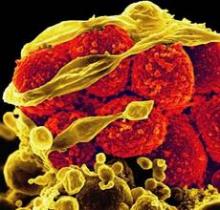User login
A diagnostic test that can identify in just hours 12 different bacteria that cause bloodstream infections has received marketing approval from the Food and Drug Administration, June 27.
The Verigene GP Blood Culture Nucleic Acid Test (BC-GP) simultaneously discerns the bacterial types and three associated resistance genes rapidly after the first sign of bacterial growth. Results can be available within 2½ hours, according to test manufacturer Nanosphere. Traditional methods require 2-4 days to identify bacteria and possible resistance.
The test can identify different types of Staphylococcus – including methicillin-resistant S. aureus – Streptococcus, Enterococcus (including vancomycin-resistant Enterococci), and Listeria.
"It is essential to identify which antimicrobial drug is appropriate for a specific patient as quickly as possible," Alberto Gutierrez, Ph.D., observed in an FDA statement. "This new test is an important tool that will help physicians treat patients quickly with the correct antibiotics." Dr. Gutierrez is the director of the Office of In Vitro Diagnostic Device Evaluation and Safety at the FDA’s Center for Devices and Radiological Health.
The agency’s decision was based on a study of 1,642 patient blood samples obtained from incubated blood culture bottles that contained gram-positive bacteria. The study included a comparison of BC-GP and traditional blood culture laboratory methods. The BC-GP results were consistent with traditional blood culture methods in 93%-100% of the comparisons, according to the FDA.
A diagnostic test that can identify in just hours 12 different bacteria that cause bloodstream infections has received marketing approval from the Food and Drug Administration, June 27.
The Verigene GP Blood Culture Nucleic Acid Test (BC-GP) simultaneously discerns the bacterial types and three associated resistance genes rapidly after the first sign of bacterial growth. Results can be available within 2½ hours, according to test manufacturer Nanosphere. Traditional methods require 2-4 days to identify bacteria and possible resistance.
The test can identify different types of Staphylococcus – including methicillin-resistant S. aureus – Streptococcus, Enterococcus (including vancomycin-resistant Enterococci), and Listeria.
"It is essential to identify which antimicrobial drug is appropriate for a specific patient as quickly as possible," Alberto Gutierrez, Ph.D., observed in an FDA statement. "This new test is an important tool that will help physicians treat patients quickly with the correct antibiotics." Dr. Gutierrez is the director of the Office of In Vitro Diagnostic Device Evaluation and Safety at the FDA’s Center for Devices and Radiological Health.
The agency’s decision was based on a study of 1,642 patient blood samples obtained from incubated blood culture bottles that contained gram-positive bacteria. The study included a comparison of BC-GP and traditional blood culture laboratory methods. The BC-GP results were consistent with traditional blood culture methods in 93%-100% of the comparisons, according to the FDA.
A diagnostic test that can identify in just hours 12 different bacteria that cause bloodstream infections has received marketing approval from the Food and Drug Administration, June 27.
The Verigene GP Blood Culture Nucleic Acid Test (BC-GP) simultaneously discerns the bacterial types and three associated resistance genes rapidly after the first sign of bacterial growth. Results can be available within 2½ hours, according to test manufacturer Nanosphere. Traditional methods require 2-4 days to identify bacteria and possible resistance.
The test can identify different types of Staphylococcus – including methicillin-resistant S. aureus – Streptococcus, Enterococcus (including vancomycin-resistant Enterococci), and Listeria.
"It is essential to identify which antimicrobial drug is appropriate for a specific patient as quickly as possible," Alberto Gutierrez, Ph.D., observed in an FDA statement. "This new test is an important tool that will help physicians treat patients quickly with the correct antibiotics." Dr. Gutierrez is the director of the Office of In Vitro Diagnostic Device Evaluation and Safety at the FDA’s Center for Devices and Radiological Health.
The agency’s decision was based on a study of 1,642 patient blood samples obtained from incubated blood culture bottles that contained gram-positive bacteria. The study included a comparison of BC-GP and traditional blood culture laboratory methods. The BC-GP results were consistent with traditional blood culture methods in 93%-100% of the comparisons, according to the FDA.
